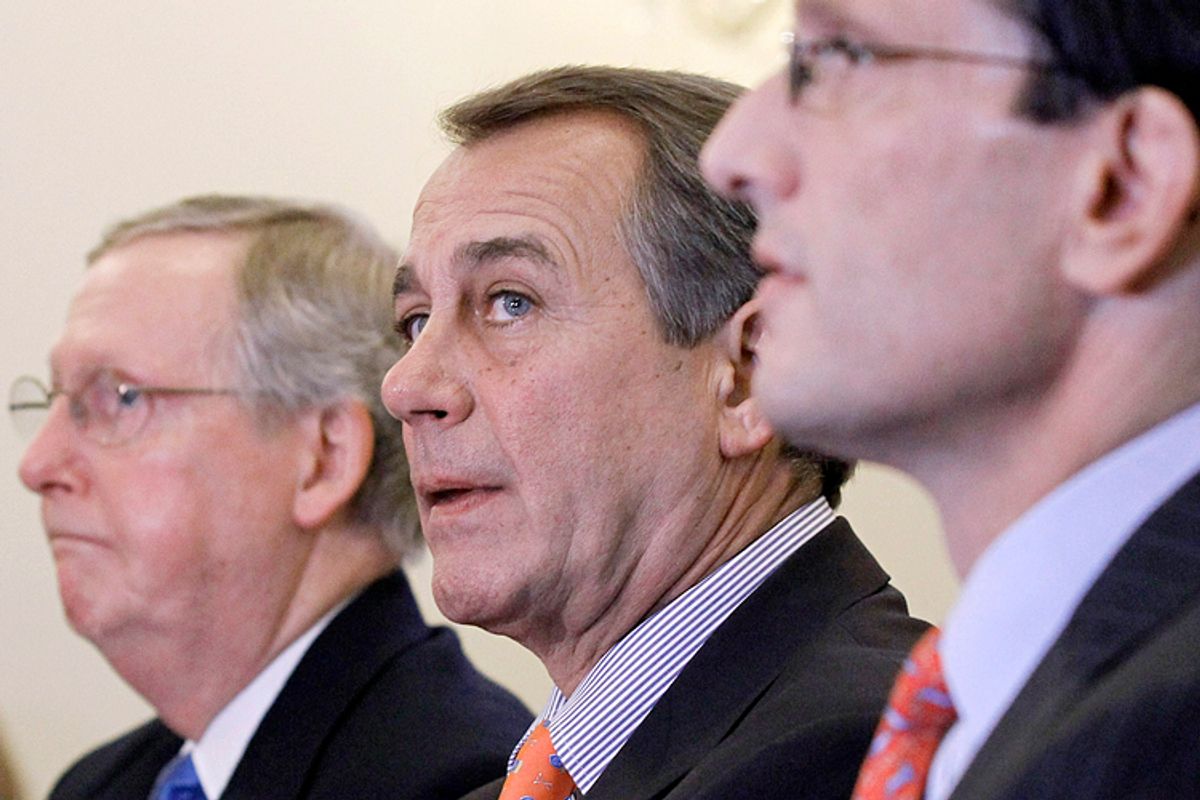There's a tendency on the right -- I don't know if it's delusion or a subtle psychological operation -- to speak as if Republicans control the House of Representatives by a wide majority, and that bills supported by 218 Republicans will be viable in the Senate and possibly signed by the president.
"We have a real chance of getting defund or delay of Obamacare," said conservative Rep. Steve Scalise, R-La.
In the conservative National Review, Robert Costa wrote that the recent turbulence over Obamacare is a result of the fact that "Republican leaders are struggling mightily to come up with [government funding] legislation that can pass the House."
If either of these statements were true, it would be huge news that House Republicans are veering further right, and giving hard-liners in the party a vote on a bill that actually ties funding for the government to defunding the healthcare law.
But they're both false.
Here are the odds that Scalise and his colleagues will defund or delay Obamacare.
Costa's so in the thick of the GOP's internal debate he elided the obvious point that "passing the House" doesn't equal winning 218 Republican votes. Plenty of reasonable stuff can pass the House above and beyond a simple bill extending funding for the government, once it gets a vote.
Put those irreducible facts together, and it's easier to remember that what we're hearing on the right is the din of 275 Republicans and thousands of movement conservatives caterwauling at each other. It's a fascinating story. It's genuinely newsworthy that John Boehner and company were cowed into giving Ted Cruz and his boosters on the right a vote on the doomed strategy they've been demanding. Assuming the defund Obamacare bill passes the House -- not a given! -- it'll be extremely revealing to watch Senate Republicans figure out what to do with it, and hear what they say when it inevitably fails.
But at the end of the day, it's really just a subplot in the ongoing saga of the GOP's devolution since 2006 or so. It's an internal bluff calling, intended to both placate conservative House members, and prove to others that their strategies aren't workable. Once that happens, then Congress can get on with the entirely separate and much simpler business of funding the government. Boehner's already copped to this! If he's able to placate enough Republicans along the way, they might even walk away with a substantial win.
In a way this is actually good news. The debt limit will likely be increased through a similar process of internal deleveraging.
But when the news broke, a lot of news outlets treated it like an escalation. The odds of a shutdown just increased, according to the political media. The only reason to believe that, though, is that all this whipsawing takes time. Is it possible there just aren't enough days on the calendar for Congress to pass a spending bill before the government shuts down? Perhaps. I continue to think it's unlikely. Twelve days is an eternity on Capitol Hill when leaders get down to brass tacks.
Even if I'm wrong, though, and there's a brief lapse in funding for the government, it'll be an error of timing, not of broader legislative strategy. GOP leaders are still working toward a much different set of objectives than their conservative antagonists, or than Newt Gingrich was in 1995. National Review might have forgotten about the 200-plus Democrats in the House, but John Boehner has not.



Shares